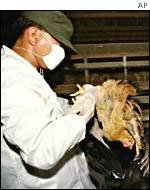Asia has been hit by one of the worst ever cases of avian influenza in the last few months. Tens of millions of poultry have been killed by the virus or slaughtered to prevent the virus from spreading.
So far, 18 people have died from the virus, making it twice as deadly as the last outbreak of avian influenza in 1997. Eleven Asian countries have reported the virus, and 10 countries have agreed to work closely to see the eradication of the disease.
A milder variant of the avian flu has been discovered in chickens in Delaware. This has led South Korea and Japan to ban U.S. poultry imports. According to a spokesperson for the U.S. Department of Agriculture, the strain discovered in Delaware has shown no evidence of transmission to humans.
The virus infecting Asian poultry is a subtype of avian influenza strain A. It occurs naturally in wild birds, and circulates among many birds worldwide, according to the Center for Disease Control website. It is highly contagious among birds, and can be fatal to domesticated birds like chickens.
Guilford biology professor Melanie MacDonald supplied a reason for the high infection rate. “Any time you have exposure of an animal to an endemic pathogen, their immune system develops changes to adapt. Because of the high inbreeding and close genetic relationships (in domesticated chickens) and because they’ve been protected, they’re not getting the exposure to have immunity to (the virus).”
Lee said, “One of the reasons influenza is so infective is because it’s passed through aerosols. Animals breathe out fine water droplets, so it gets in by way of the oral or nasal cavity and infects the mucus membranes.”
It is likely that the virus was also spread to humans in this way – from a farm worker breathing in fecal material in the air.
Symptoms of the flu in humans range from typical flu symptoms like fever, cough, and sore throat, to eye infections, viral pneumonia, and possibly life-threatening complications.
So far, the virus has not acquired genes from human influenza viruses, which would make its spread among people more efficient. If it does mutate to affect humans, this strain of avian influenza could begin a pandemic. This virus has so far been restricted to birds, so humans have little or no immune protection to the disease.
Thailand’s Prime Minister Thaksin Shinawatra admitted to making a mistake when Thailand’s government was criticized about hiding the outbreak of the bird flu.
World Health Organization (WHO) officials have urged countries affected by the bird flu to be honest with their citizens about the risks of the disease.
The WHO also said that it has eleven pharmaceutical companies standing by to help make a vaccine for humans.
Categories:
Avian Influenza kills millions of poultry
Eamon Barker
•
February 13, 2004

Officials attempt to contain the outbreak (www.news.bbc.co.uk)
0
More to Discover
